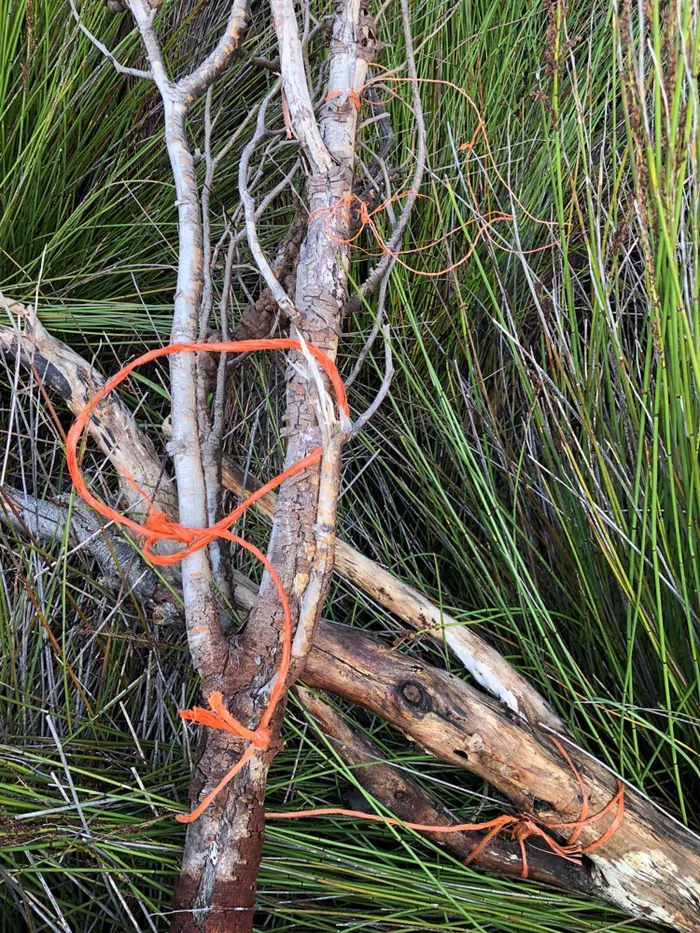Snares threaten wildlife and pets

An example of the snares threatening wildlife and pets in the wetlands.
Illegal snares are a threat to wildlife and domestic animals in the Noordhoek wetlands, says a local community group that is removing them.
Karoline Hanks and her team at Project Noordhoeked, a non-profit community project run by volunteers and residents, have worked in the wetland area for years removing and clearing the invasive Port Jackson.
They were alerted to the snares after a resident’s puppy got its jaw caught in one, said Ms Hanks.
“This is not for sensitive people, but, unfortunately, this is the current reality out in our wetland. Many hundreds of snares have been found and removed. Some with evidence of struggle and death, some not.”
The snares can be as simple as a piece of wire, cable, twine or nylon fashioned into a noose. The noose is then anchored to trees and positioned to capture animals either by the foot or by the head or body.
“Last week, we were taken out by an experienced tracker and shown what’s what, and my team proved themselves to be capable and competent. In the space of two hours, they removed seven snares,” she said.
“This is our last little vestige of wildlife and it’s being squeezed into these pockets, and we have to make a plan. The beauty of the snare work is that they can only put the snares on the Port Jackson trees, so get rid of that and hopefully, we get rid of the snare problem.”
The Noordhoek Ratepayers’ Association (NRPA) recently donated an electric chainsaw to Project Noordhoeked. “We strive to help those who are making a difference in their communities,” said NRPA chairman Brad Bing.
Ecologist Dr Gabriella Leighton, of the Urban Caracal Project, said they had recorded several cases of caracals caught in snares both on and off the Cape Peninsula over the years, including in the Noordhoek wetlands.
“Most poaching on the Cape Peninsula is undertaken by people trying to find food. As such, the snares are aimed at animals like antelope (e.g., grysbok) but many other ‘non-target’ species can get caught too.
“If the animal is caught, then it will be killed by the poacher or will die from injury or starvation while trapped in the snare. However, if it manages to break free, it can take days or weeks to die from the injury and associated infections,” Dr Leighton said.
In June, the Cape of Good Hope SPCA warned that a pandemic of illegal snaring was taking place and threatening animal life on the south peninsula's urban edge.
According to SPCA chief inspector Jaco Pieterse, their wildlife department responds to at least two call-outs a month to retrieve animals stuck in active snares, and what is needed is greater awareness of the prevalence of snares in neighbourhoods, the damage that they cause, and the substantial risk that they pose to not only all wildlife species but to domestic pets as well.
“We are constantly lobbying residents, trail users, neighbourhood watch members, local landowners and farmers to remain vigilant to the presence of snares on their property and at their boundary fences, to remove any active snares that they may see, and to report the presence of any snares to the SPCA so that we can contribute to mapping the areas commonly snared,” he said.
If you find a live wild animal caught in a snare, immediately contact the Cape of Good Hope SPCA at 021 700 4158/9 (office hours) or 083 326 1604 (after hours) or email to inspectorate@spca-ct.co.za
For details on how you can get involved in supporting Project Noordhoeked, contact Karoline Hanks at 083 745 3060 or email karabos@mweb.co.za